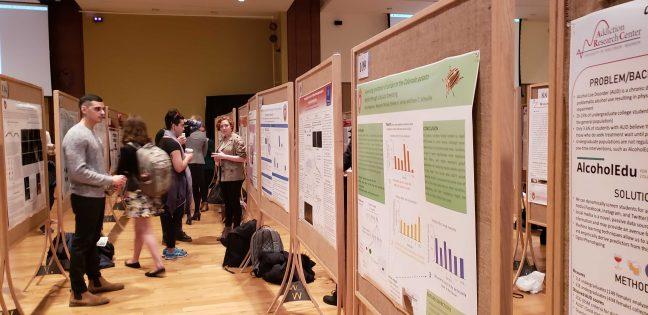Colorful posters adorned the walls of Union South’s Varsity Hall Friday as business-casual students, researchers and their peers discussed a variety of different topics — everything from medical science to virtual reality to textile design. The Undergraduate Research Symposium showcased the work of undergraduates involved in campus research and creative projects.
For many undergraduates, the idea of doing research alongside career scientists and professionals can feel daunting, especially for freshmen or underclassmen who have never been directly exposed to the fields they’re interested in pursuing. Freshman Tyler Wolter said in his field — mathematics — there are significant challenges to address before breaking into research as an underclassman.
“It’s very difficult to get involved in research very early on, it’s basically unheard of,” Wolter said.
Wolter joined the Undergraduate Research Scholars program, run by the College of Letters and Science, in order to get some experience in a lab early on. He said the program was beneficial, and overall a very positive experience.
According to their website, URS is a two to three credit class that helps match students with a research mentor to work on a project throughout the year, coupled with a weekly seminar. Many of the presenters at the symposium were students affiliated with the program, including Wolter and freshman biology major Amy Regenbaum.
“I found it has been a great program to dive right into research,” Regenbaum said of URS.
Regenbaum found out about the program at Student Orientation, Advising and Registration and decided to enroll shortly after. She said the program was valuable not only for the research experience but also for what it taught her about the challenges and rewards that come with being a scientist.
Regenbaum said she’d picked her lab — which works with rats — partly because she was curious whether or not working with animals was the right decision for her.
“I wanted to see if I could handle working with animals as someone who is so scared of [them],” Regenbaum said. “I’ve realized now that I really can’t do animal research … and that’s okay. I’ve realized that I am definitely not going pre-med.”
While many presenters at the symposium were involved with URS, others sought out research opportunities independently.
Senior Quintin Gaus studies psychology. He works with the Social Media and Adolescent Health Research Team, and instead of joining them through a program like URS, he simply noticed that their work fit with the kinds of things he’s interested in, and reached out.
While Gaus had never been involved in research in his undergraduate career before, he said that his experience with the SMAHRT team made him more open to considering pursuing research as a career. He also said the experience of getting to run his own project while building community with his colleagues was invaluable.
“It definitely helps build that confidence that you are able to build a study and run it, and get the results and present it,” Gaus said.
Gaus said he would encourage any undergraduate interested in doing research but was unsure about how to proceed to simply find a professor with similar interests and reach out.
Wolter described some of the benefits beyond just helping run a research project that the symposium brought him.
“Being able to go and directly see what one of these fields is like has been very beneficial,” Wolter said. “It’s also been good to be able to learn how to read research papers and learn how to find the knowledge that I need.”
All three students said that their foray into research was a very positive experience. Wolter and Gaus said this was in part motivated by the environment and community it connected them with, whether it be their lab or their peers.
Wolter said the symposium — and the URS program — was a positive environment because of the exposure it brought him to other projects many of his peers were involved in on campus.
“There’s a lot of different research going on, there’s a lot of different people doing research, so it’s just been nice hearing what everyone’s working on while being able to also share what I’m doing,” Wolter said.
All three undergraduates said they were interested in continuing to conduct research, either as a future career or as a way to supplement the rest of their academic experience.
Regenbaum said she planned to continue working with her lab throughout her undergraduate years. She said having the prior experience will help, especially when she takes Biology 152, a class that requires conducting an independent research project.
“I will probably stick through it for years to come,” Regenbaum said.


